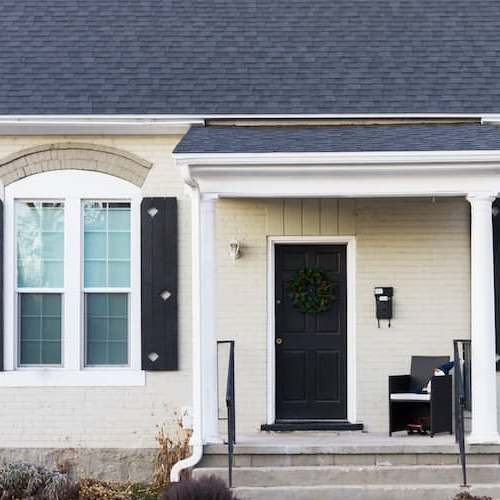Earnest money and VA loans: What you need to know
May 29, 2024
•6-minute read
Including earnest money with your offer can give you a leg up on other buyers in a competitive real estate market. Earnest money essentially acts as a security deposit. It lets sellers know you’re serious about purchasing their home. While earnest money isn’t required for VA loan approval, it can make your offer stand out and get you closer to buying the home of your dreams.
But read the fine print in your purchase agreement. If you’re not careful, you may forfeit your earnest money deposit. Understanding how earnest money works with Department of Veterans Affairs (VA) loans can protect your investment and improve your odds of submitting a winning offer.
What is earnest money?
Sometimes referred to as a good faith deposit, earnest money shows a seller you're serious about purchasing their home. In a seller's market – where buyers typically have less bargaining power – a large, upfront earnest money deposit can strengthen their offer.
Once a seller accepts an offer, they enter into purchase agreement negotiations with the buyer and usually take the home off the market. Taking the home off the market can be risky for sellers. If the agreement falls apart, they’ll likely have to relist the property, costing them time and money. Earnest money can protect a seller from potential losses if the buyer decides not to move forward with the sale for a reason that isn’t outlined in the purchase agreement.
The average earnest money deposit ranges from 1% – 3% of a home's purchase price. The amount a home buyer puts down will depend on market conditions.
The deposit will sit in an escrow account until the deal is complete. If the deal goes as planned, the earnest money deposit is applied to the buyer’s down payment or closing costs.
If the home doesn't pass inspection or satisfy other contingencies in the purchase agreement, the buyer can walk away from the deal and keep their earnest money deposit.
Do VA loans require earnest money?
While VA loans don’t require an earnest money deposit, sellers in competitive real estate markets may request a deposit as part of an offer. The deposit would go a long way in reassuring the seller that you’re a serious buyer and are ready to move forward with the home purchase. Also, it’s not uncommon for a seller to make this request even if you’re using a VA loan to finance your purchase.
If you decide to offer earnest money, the VA requires that it come directly from you. The deposit can’t be a gift or loan. Before the deposit is accepted, the VA or your lender will verify the source of the funds.
Keep in mind that some types of mortgages and states require earnest money. For example, if you’re buying real estate in Florida, you almost always include an earnest money deposit.
Should you offer earnest money with a VA loan?
Although earnest money isn’t a VA lender requirement, it can give you a competitive edge in a hot seller’s market. In a seller’s market, the demand for housing exceeds the supply, forcing home buyers to compete for the same homes. The seller has the advantage because available homes for sale are scarce.
A seller juggling multiple offers will likely pay more attention to the offer with an earnest money deposit attached and favorable purchase agreement terms. And the benefits for the buyer don’t stop there. If you make it to closing, your earnest money deposit will be applied to your down payment or closing costs, reducing the amount of money you need to complete the transaction.
Pros and cons of VA loans and offering earnest money
Look at your situation and observe the conditions in your real estate market to help you decide whether you need earnest money with a VA loan. To make an informed decision, weigh the advantages and disadvantages of offering earnest money.
Pros of VA loans and offering earnest money
An earnest money deposit tells a seller you’re committed to buying their property, and it can give you an edge over other offers. It may also strengthen your position as you negotiate purchase agreement terms with the seller.
The VA allows sellers to cover up to 4% of the purchase price in closing costs on a VA loan. A good faith deposit can help you strengthen your relationship with the seller.
Cons of VA loans and offering earnest money
The most significant disadvantage of offering earnest money with a VA home loan is that you could lose money if you violate the purchase agreement terms. Purchase agreements usually outline the timeline to complete the home buying process. Failing to complete the transaction within the agreed time frame may breach your contract terms and cost you your earnest money deposit.
If you have a change of heart and decide you no longer want to buy the home, you may forfeit your earnest money deposit if your reason for walking away isn’t in the contract. You must pay close attention to contract deadlines and continually reassess how much you want the home to protect your investment.
How much earnest money should you offer with a VA loan?
The earnest money offer amount usually depends on the market you’re buying in. The average deposit ranges from 1% – 3%, but in red-hot markets, you may need to deposit 10% of the home’s purchase price.
If you’re purchasing a property in a buyer’s market – where the houses for sale outnumber the buyers – you may not need to put as much down.
A real estate agent can guide you on the appropriate amount of earnest money to offer for your situation. To increase the odds of a seller accepting your offer, you shouldn’t offer too much or too little – an agent can help you decide on an appropriate amount.
Is earnest money refundable with a VA loan?
The purchase agreement will outline what happens to the earnest money deposit if the contract falls through. Most purchase agreements have mortgage contingencies that allow the buyer to back out of the deal without losing their deposit.
For example, if the contract states a buyer can walk away if the home inspection doesn’t meet their expectations, the buyer can walk away from the deal and get their earnest money back. If a buyer’s change of heart isn’t covered under the contract terms, the earnest money will go to the seller.
Here are some common contingencies that can help keep your earnest money safe:
- Home inspection contingency: This contingency gives a buyer the right to back out of the deal if the home inspection uncovers significant defects or issues with the home. But problems in the home, including significant ones, don’t have to be a deal breaker. If you still want the home, negotiate repairs or the home's purchase price with the seller.
- Appraisal contingency: If the home appraisal comes in lower than expected, this contingency will protect the buyer's earnest money deposit. An appraisal contingency is included in every VA loan purchase.
- Financing contingency: If your VA loan isn't approved by the contract deadline, a financing contingency will ensure you get an earnest money refund.
- Home sale contingency: This contingency indicates you need to sell your home before you can buy a new one. In a competitive market, this contingency may weaken your offer.
It can be tempting to waive contingencies while properties fly off the market. But waiving contingencies can backfire. What happens if you waive the inspection contingency and the inspector uncovers significant issues with the home?
Contingencies can protect a buyer’s interest – and potential earnest money – during the home buying process. While it can be tempting, don’t forgo contingencies just to make your offer more competitive.
FAQs on VA loans and earnest money
Offering earnest money with a VA loan can help make your offer more attractive but isn’t a requirement. Get the answers to your frequently asked questions about earnest money and VA loans.
What is earnest money?
Sometimes referred to as a good faith deposit, earnest money shows a seller you're serious about purchasing their home. In a seller's market – where buyers typically have less bargaining power – a large, upfront earnest money deposit can strengthen their offer.
Do VA loans require earnest money?
While VA loans don’t require an earnest money deposit, sellers in competitive real estate markets may request a deposit as part of an offer. The deposit would go a long way in reassuring the seller that you’re a serious buyer and are ready to move forward with the home purchase.
How much earnest money should you offer with a VA loan?
The earnest money offer amount usually depends on the market you’re buying in. The average deposit ranges from 1% – 3%, but in red-hot markets, you may need to deposit 10% of the home’s purchase price.
Is earnest money refundable with a VA loan?
The purchase agreement will outline what happens to the earnest money deposit if the contract falls through. Most purchase agreements have mortgage contingencies that allow the buyer to back out of the deal without losing their deposit.
The bottom line: VA loans and earnest money
If you plan to finance your new home with a VA loan, you should know you’re not required to offer an earnest money deposit. However, if you’re home shopping in a hot real estate market, including earnest money with your VA loan and offer can give you an edge over the competition.
Consult your real estate agent if you’re unsure what kind of leverage an earnest money deposit might give you.
Ready to dive into the home loan process? Start an application for approval with Rocket Mortgage® today.

Ashley Kilroy
Ashley Kilroy is an experienced financial writer. In addition to being a contributing writer at Rocket Homes, she writes for solo entrepreneurs as well as for Fortune 500 companies. Ashley is a finance graduate of the University of Cincinnati. When she isn’t helping people understand their finances, you may find Ashley cage diving with great whites or on safari in South Africa.
Related resources

9-minute read
VA Streamline refinance (VA IRRRL): What is it and how does it work?
A VA IRRRL may be the best option for you if you want lower monthly payments. Read our article to learn more about VA Streamline refinance and how it works.<...
Read more

8-minute read
Buying a second home with a VA loan
VA loans are designed to help military personnel, veterans, and their families buy a primary residence, but there are ways you can use one to buy a second home.
Read more

6-minute read
How many times can you use a VA loan?
There’s no limit to the number of VA loans qualified borrowers can take out, but you usually can’t hold multiple VA loans at once. Let’s break...
Read more